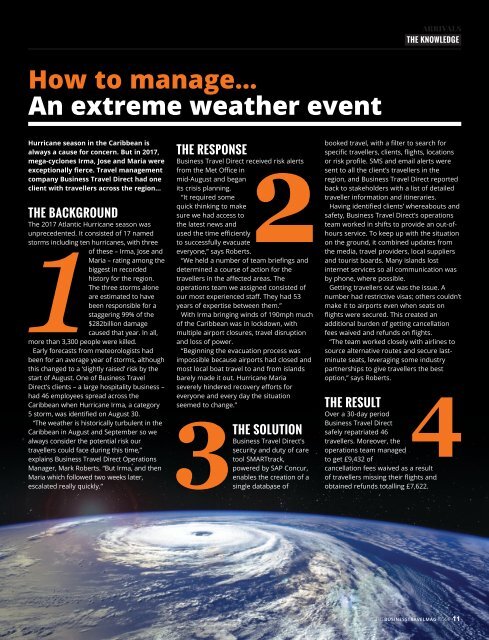You also want an ePaper? Increase the reach of your titles
YUMPU automatically turns print PDFs into web optimized ePapers that Google loves.
ARRIVALS<br />
THE KNOWLEDGE<br />
How to manage...<br />
An extreme weather event<br />
Hurricane season in the Caribbean is<br />
always a cause for concern. But in 2017,<br />
mega-cyclones Irma, Jose and Maria were<br />
exceptionally fierce. <strong>Travel</strong> management<br />
company <strong>Business</strong> <strong>Travel</strong> Direct had one<br />
client with travellers across the region…<br />
THE BACKGROUND<br />
<strong>The</strong> 2017 Atlantic Hurricane season was<br />
unprecedented. It consisted of 17 named<br />
storms including ten hurricanes, with three<br />
of these – Irma, Jose and<br />
Maria – rating among the<br />
biggest in recorded<br />
history for the region.<br />
<strong>The</strong> three storms alone<br />
are estimated to have<br />
been responsible for a<br />
staggering 99% of the<br />
$282billion damage<br />
caused that year. In all,<br />
more than 3,300 people were killed.<br />
Early forecasts from meteorologists had<br />
been for an average year of storms, although<br />
this changed to a ‘slightly raised’ risk by the<br />
start of August. One of <strong>Business</strong> <strong>Travel</strong><br />
Direct’s clients – a large hospitality business –<br />
had 46 employees spread across the<br />
Caribbean when Hurricane Irma, a category<br />
5 storm, was identified on August 30.<br />
“<strong>The</strong> weather is historically turbulent in the<br />
Caribbean in August and September so we<br />
always consider the potential risk our<br />
travellers could face during this time,”<br />
explains <strong>Business</strong> <strong>Travel</strong> Direct Operations<br />
Manager, Mark Roberts. “But Irma, and then<br />
Maria which followed two weeks later,<br />
escalated really quickly.”<br />
THE RESPONSE<br />
<strong>Business</strong> <strong>Travel</strong> Direct received risk alerts<br />
from the Met Office in<br />
mid-August and began<br />
its crisis planning.<br />
“It required some<br />
quick thinking to make<br />
sure we had access to<br />
the latest news and<br />
used the time efficiently<br />
to successfully evacuate<br />
everyone,” says Roberts.<br />
“We held a number of team briefings and<br />
determined a course of action for the<br />
travellers in the affected areas. <strong>The</strong><br />
operations team we assigned consisted of<br />
our most experienced staff. <strong>The</strong>y had 53<br />
years of expertise between them.”<br />
With Irma bringing winds of 190mph much<br />
of the Caribbean was in lockdown, with<br />
multiple airport closures, travel disruption<br />
and loss of power.<br />
“Beginning the evacuation process was<br />
impossible because airports had closed and<br />
most local boat travel to and from islands<br />
barely made it out. Hurricane Maria<br />
severely hindered recovery efforts for<br />
everyone and every day the situation<br />
seemed to change.”<br />
THE SOLUTION<br />
<strong>Business</strong> <strong>Travel</strong> Direct’s<br />
security and duty of care<br />
tool SMARTtrack,<br />
powered by SAP Concur,<br />
enables the creation of a<br />
single database of<br />
booked travel, with a filter to search for<br />
specific travellers, clients, flights, locations<br />
or risk profile. SMS and email alerts were<br />
sent to all the client’s travellers in the<br />
region, and <strong>Business</strong> <strong>Travel</strong> Direct reported<br />
back to stakeholders with a list of detailed<br />
traveller information and itineraries.<br />
Having identified clients’ whereabouts and<br />
safety, <strong>Business</strong> <strong>Travel</strong> Direct’s operations<br />
team worked in shifts to provide an out-ofhours<br />
service. To keep up with the situation<br />
on the ground, it combined updates from<br />
the media, travel providers, local suppliers<br />
and tourist boards. Many islands lost<br />
internet services so all communication was<br />
by phone, where possible.<br />
Getting travellers out was the issue. A<br />
number had restrictive visas; others couldn’t<br />
make it to airports even when seats on<br />
flights were secured. This created an<br />
additional burden of getting cancellation<br />
fees waived and refunds on flights.<br />
“<strong>The</strong> team worked closely with airlines to<br />
source alternative routes and secure lastminute<br />
seats, leveraging some industry<br />
partnerships to give travellers the best<br />
option,” says Roberts.<br />
THE RESULT<br />
Over a 30-day period<br />
<strong>Business</strong> <strong>Travel</strong> Direct<br />
safely repatriated 46<br />
travellers. Moreover, the<br />
operations team managed<br />
to get £9,432 of<br />
cancellation fees waived as a result<br />
of travellers missing their flights and<br />
obtained refunds totalling £7,622.<br />
THEBUSINESSTRAVELMAG.COM<br />
11

















